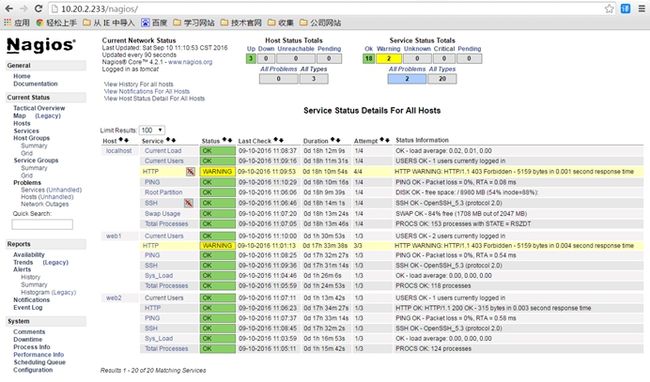Nagios是一款企业级开源免费的监控工具,其关注点在于保证服务的正常运行,并且在服务发生问题时提供报警机制。
1. 实验环境
Nagios服务端:10.20.2.233
Nagios监控端:web1(10.20.2.2.235) 、 web2(10.20.2.236)
2. Nagios服务端部署
1) 安装nagios依赖软件包
通过yum方式快速安装Nagios所需的依赖软件包
yum -y install gd gd-devel openssl openssl-devel httpd php gcc glibc glibc-common make net-snmp wget
2) 创建nagios账户与组
配置时使用--with-nagios-user和--with-nagios-group指定以该账号的身份运行Nagios。
useradd nagios
3) ×××地址
Nagios:
http://superb-sea2.dl.sourceforge.net/project/nagios/nagios-4.x/nagios-4.2.1/nagios-4.2.1.tar.gz
Nagios-plugin:
https://nagios-plugins.org/download/nagios-plugins-2.1.2.tar.gz
Nrpe:
http://pilotfiber.dl.sourceforge.net/project/nagios/nrpe-3.x/nrpe-3.0.1.tar.gz
4) Nagios的安装
tar -zxf nagios-4.2.1.tar.gz -C /usr/local cd /usr/local cd nagios-4.2.1/ ./configure --with-nagios-user=nagios --with-nagios-group=nagios make all make install #安装主程序,CGI以及HTML文件 make install-init #安装启动脚本/etc/init.d/nagios make install-commandmode #安装与配置目录权限 make install-config #安装配置文件模板 # 由于nagios最终将以web的形式进行管理与监控,安装过程中使用make install-webconf命令将生成Apache附加配置文件/etc/httpd/conf.d/nagios.conf make install-webconf
5) Nagios插件安装
tar -zxf nagios-plugins-2.1.2.tar.gz -C /usr/local cd /usr/local/nagios-plugins-2.1.2/ ./configure --prefix=/usr/local/nagios make make install tar -zxf nrpe-3.0.1.tar.gz -C /usr/local/ cd /usr/local cd nrpe-3.0.1/ ./configure --prefix=/usr/local/nagios make all make install-plugin make install-daemon make install-daemon-config chown nagios:nagios -R /usr/local/nagios
6) 禁用selinux并关闭防火墙
setenforce 0 service iptables stop
7) 创建web访问账户
htpasswd -c /usr/local/etc/htpasswd.users tomcat
8) 启动nagios
/etc/init.d/httpd start /etc/init.d/nagios start
9) 修改nagios配置文件
主配置文件:nagios.cfg
主配置文件中使用cfg_file配置项加载其他配置文件,为了方便管理,将两台监控主机创建不同的配置文件,10.20.2.235配置文件名为web1.cfg,10.20.2.236配置文件名为web2.cfg
vi /usr/local/nagios/etc/nagios.cfg cfg_file=/usr/local/nagios/etc/objects/commands.cfg cfg_file=/usr/local/nagios/etc/objects/contacts.cfg cfg_file=/usr/local/nagios/etc/objects/timeperiods.cfg cfg_file=/usr/local/nagios/etc/objects/templates.cfg # Definitions for monitoring the local (Linux) host cfg_file=/usr/local/nagios/etc/objects/localhost.cfg #下面两个配置文件需要手动创建出来,用于监控两台web服务器 cfg_file=/usr/local/nagios/etc/web1.cfg cfg_file=/usr/local/nagios/etc/web2.cfg ……
修改CGI配置文件(cgi.cfg),需要将访问web页面的账号加入进来
vi /usr/local/nagios/etc/cgi.cfg use_authentication=1 authorized_for_system_information=nagiosadmin,tomcat authorized_for_configuration_information=nagiosadmin,tomcat authorized_for_system_commands=nagiosadmin,tomcat authorized_for_all_services=nagiosadmin,tomcat authorized_for_all_hosts=nagiosadmin,tomcat authorized_for_all_service_commands=nagiosadmin,tomcat authorized_for_all_host_commands=nagiosadmin,tomcat ……
修改命令配置文件(commands.cfg),该文件定义具体的命令实现方式,如发送报警邮件具体使用什么工具、邮件内容格式定义。
vi /usr/local/nagios/etc/objects/commands.cfg
……
define command{
command_name check-host-alive
command_line $USER1$/check_ping -H $HOSTADDRESS$ -w 3000.0,80% -c 5000.0,100% -p 5
}
……
#以下内容需要手动添加,用于进行远程主机监控,需要安装nrpe软件包
define command{
command_name check_nrpe
command_line $USER1$/check_nrpe -H $HOSTADDRESS$ -c $ARG1$
}
修改nrpe配置文件(nrpe.cfg),用于监控远程主机所需要的命令
vi /usr/local/nagios/etc/nrpe.cfg command[check_users]=/usr/local/nagios/libexec/check_users -w 5 -c 10 command[check_load]=/usr/local/nagios/libexec/check_load -w 15,10,5 -c 30,25,20 command[check_hda1]=/usr/local/nagios/libexec/check_disk -w 20% -c 10% -p /dev/hda1 command[check_zombie_procs]=/usr/local/nagios/libexec/check_procs -w 5 -c 10 -s Z command[check_total_procs]=/usr/local/nagios/libexec/check_procs -w 150 -c 200 #下面一行为手动添加 command[check_disk]=/usr/local/nagios/libexec/check_disk -w 20% -c 10% ……
修改监控主机配置文件(localhost.cfg),该文件用于设置如何监控本机服务器资源。
vi /usr/local/nagios/etc/objects/localhost.cfg
……
define host{
use linux-server ; Name of host template to use
; This host definition will inherit all variables that are defined
; in (or inherited by) the linux-server host template definition.
host_name localhost
alias localhost
address 127.0.0.1
}
……
define hostgroup{
hostgroup_name linux-servers ; The name of the hostgroup
alias Linux Servers ; Long name of the group
members localhost ; Comma separated list of hosts that belong to this group
}
……
创建远程监控配置文件web1.cfg与web2.cfg,用于监控远程服务器系统资源与服务,可以使用localhost.cfg作为参考模板。下面列出web1.cfg的所有内容,web2.cfg 只需要参考web1.cfg的内容修改主机名称、IP地址以及主机名称即可。
define host{
use linux-server ; Name of host template to use
; This host definition will inherit all variables that are defined
; in (or inherited by) the linux-server host template definition.
host_name web1
alias test.com
address 10.20.2.235
}
define hostgroup{
hostgroup_name webs ; The name of the hostgroup
alias Linux Servers ; Long name of the group
members web1 ; Comma separated list of hosts that belong to this group
}
define service{
use generic-service ; Name of service template to use
host_name web1
service_description PING
check_command check_ping!100.0,20%!500.0,60%
notifications_enabled 1
}
define service{
use generic-service ; Name of service template to use
host_name web1
service_description Sys_Load
check_command check_nrpe!check_load
notifications_enabled 1
}
define service{
use generic-service ; Name of service template to use
host_name web1
service_description Current Users
check_command check_nrpe!check_users
notifications_enabled 1
}
define service{
use generic-service ; Name of service template to use
host_name web1
service_description Total Processes
check_command check_nrpe!check_total_procs
notifications_enabled 1
}
define service{
use generic-service ; Name of service template to use
host_name web1
service_description SSH
check_command check_ssh
notifications_enabled 1
}
define service{
use generic-service ; Name of service template to use
host_name web1
service_description HTTP
check_command check_http
notifications_enabled 1
}
10) 重新加载nagios配置
其他配置文件不需修改,可以直接使用,重启nagios,重新加载所有的配置
/etc/init.d/nagios restart
3. Nagios监控端部署
下面以web1为例,web2与web1操作一致
1) yum安装nagios插件需依赖的软件包
yum -y install openssl openssl-devel
2) 创建nagios用户和组
useradd -s /sbin/nologin nagios
3) 安装Nagios-plugin
tar -zxf nagios-plugins-2.1.2.tar.gz -C /usr/local cd /usr/local/ cd nagios-plugins-2.1.2/ ./configure make make install
4) 安装Nrpe
tar -zxf nrpe-3.0.1.tar.gz -C /usr/local cd /usr/local/nrpe-3.0.1/ ./configure make all make install-plugin make install-daemon make isntall-daemon-config chown -R nagios:nagios /usr/local/nagios
5) 修改nrpe配置文件
cp /usr/local/nrpe-3.0.1/sample-config/nrpe.cfg /usr/local/nagios/etc/ vi /usr/local/nagios/etc/nrpe.cfg …… allowed_hosts=127.0.0.1,10.20.2.233 …… command[check_users]=/usr/local/nagios/libexec/check_users -w 5 -c 10 command[check_load]=/usr/local/nagios/libexec/check_load -w 15,10,5 -c 30,25,20 command[check_hda1]=/usr/local/nagios/libexec/check_disk -w 20% -c 10% -p /dev/hda1 command[check_zombie_procs]=/usr/local/nagios/libexec/check_procs -w 5 -c 10 -s Z command[check_total_procs]=/usr/local/nagios/libexec/check_procs -w 150 -c 200 #下面一行为手动添加 command[check_disk]=/usr/local/nagios/libexec/check_disk -w 20% -c 10%
6) 禁用selinux并关闭防火墙
setenforce 0 service iptables stop
7) 启动nrpe
/usr/local/nagios/bin/nrpe -c /usr/local/nagios/etc/nrpe.cfg -d
4. 验证并进行监控
1) 验证监控端的nrpe
管理员在Nagios服务端通过check_nrpe检测被监控端相关的性能参数,单独使用check_nrpe可以检测被监控端的nrpe版本号
[root@test etc]# /usr/local/nagios/libexec/check_nrpe -H 10.20.2.235 NRPE v3.0.1 [root@test etc]# /usr/local/nagios/libexec/check_nrpe -H 10.20.2.236 NRPE v3.0.1 [root@test etc]# /usr/local/nagios/libexec/check_nrpe -H 10.20.2.237 connect to address 10.20.2.237 port 5666: Connection refused connect to host 10.20.2.237 port 5666: Connection refused
2) 访问web页面进行监控
以上信息已经能够检测到被监控端的nrpe,此时可以通过浏览器进行访问:
http://10.20.2.233/nagios


